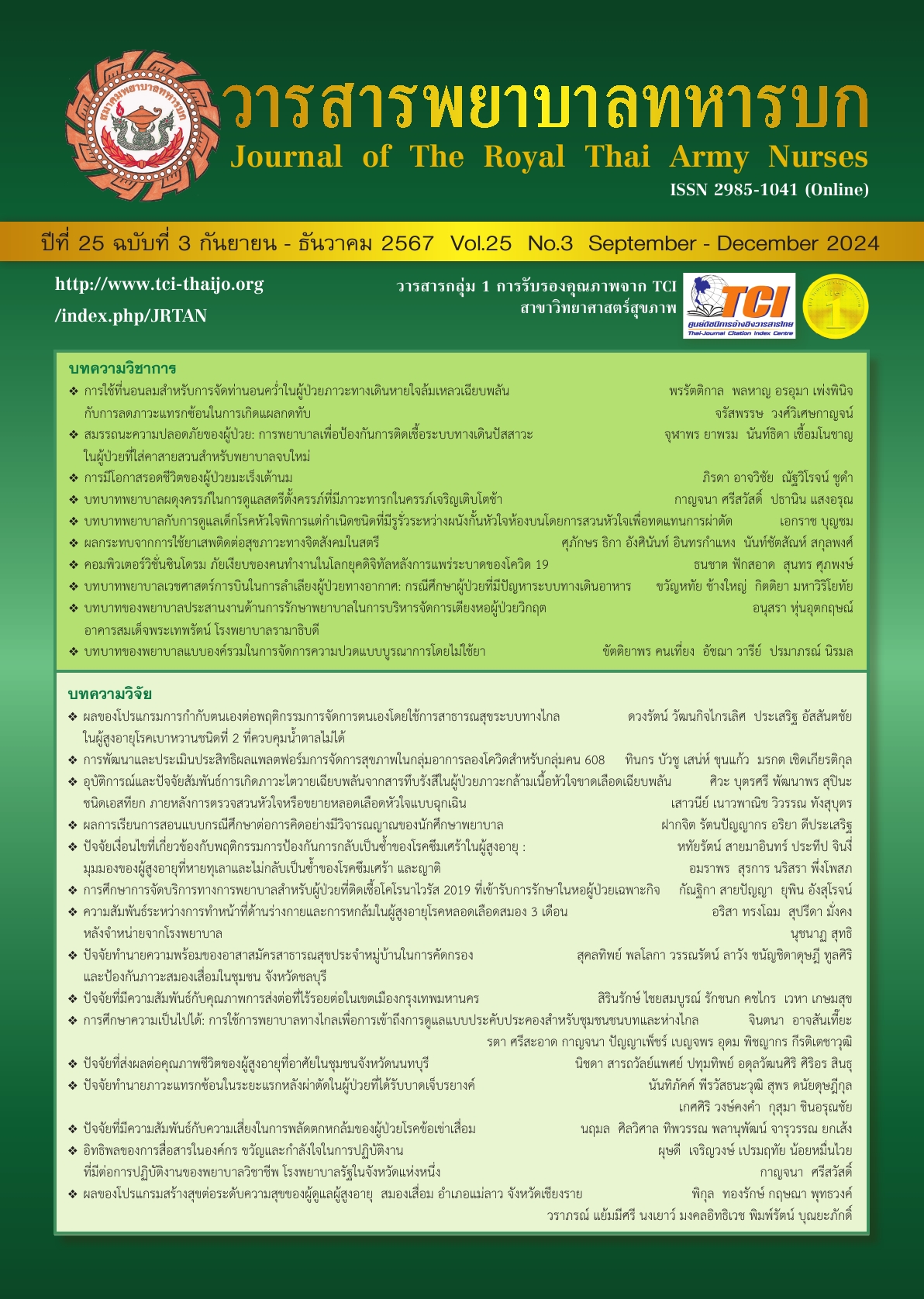Factors Related to the Deterioration of Patients with Mild Traumatic Brain Injury
Keywords:
Traumatic Brain Injury, The Deterioration, Patients with Mild Traumatic Brain InjuryAbstract
This study was retrospective, documentary research. The objective was to study the personal factors and health factors of the deterioration of patients with mild traumatic brain injury Samples were medical record of patients diagnosed mild traumatic brain injury. And there were deterioration 28 patients who were admitted to neurosurgery department II, Ratchaburi hospital between January 1, 2019 and December 31,2021. The instrument used to collect information includes data collection form of deterioration of patients with mild traumatic brain injury. The content validity index was 0.99 and inter-rater reliability was 0.80 The general data were analyzed using descriptive statistics and correlation analysis between variables using inferential statistics.
The result found that the personal factors such as gender, was associated with systolic blood pressure (Ø = -.452) and pulse pressure (Ø = -.552), as well as drunken condition was associated with systolic blood pressure (Ø = -.486). Health factors include post-traumatic of intracerebral hemorrhage in a type of Subdural hemorrhage was associated with pulse rate (Ø = -.469), traumatic intracerebral hemorrhage was associated with systolic blood pressure (Ø = .452) and cerebral contusion was associated with Diastolic blood pressure (Ø = -.430) at a statistically significant (p<.05).
This research showed that the relevant health care team must define the planning to develop guidelines to care for them, especially, the Computerized thermographic scan for investigation and primary treatment to reduce complications and life-saving.
Downloads
References
The Royal college of Neurological surgeons of Thailand, department of medical services, office of the permanent secretary of MOPH, Neurological Institute of Thailand, Directorate of Medicine Service, Royal Thai Air Force, Office of the Higher Education Commission. Clinical Practice Guidelines for Traumatic Brain Injury. Bangkok Thailand: ROSPEROUS PLUS. 2019.
Potaya S. The Glasgow Coma Scale. Journal of The Royal Thai Army Nurses. 2018; 19(1):30-8. (in Thai)
Zollman FS. Manual of Traumatic Brain Injury Management. Chicago: Demos Medical. 2011.
Bureau of Highway Safety. Traffic Accident on National Highways in 2017. Annual Report 2017; 2017, May 21; Bangkok Thailand: Statistical Information Group. 2017. (in Thai)
Khiewchaum R. Holistic Nursing for Traumatic Brain Injury Patient. Journal of Phrapokklao Nursing College. 2017; 28(1): 129-39. (in Thai)
National institute for emergency medicine. Annual Report 2016; Bangkok Thailand, National institute for emergency medicine. 2016. (in Thai)
Thaiudom A, & Dean-Baar S. Health-related Consequences of Traumatic Brain Injury: A Scoping Review. Journal of The Royal Thai Army Nurses. 2022; 23(1):65-72. (in Thai)
Yuksen C, Trinarongsakul P, & Sittichanbuncha Y. Emergency care: the pocket guide book. 6th. Bangkok Thailand: Emergency of medicine, Faculty of medicine Ramathibodi hospital, Mahidol university. 2016.
Chojak R, Koźba-Gosztyła M, Pawłowski M, & Czapiga B. Deterioration After Mild Traumatic Brain Injury: A Single-Center Experience with Cost Analysis. Front Neurol. 2021. 24;12: 588429. doi:10.3389/fneur.2021.588429
Stiell IG, Wells GA, Vandemheen K, et al. The Canadian CT Head Rule for patients with minor head injury. Lancet. 2001;357(9266):1391-6. doi:10.1016/s0140-6736(00)04561-x
Smith M, & Parker M. Nursing Theories and Nursing Practice. 4th. Philadelphia, PA: FA Davis. 2015.
Maric-Bilkan C, & Manigrasso MB. Sex differences in hypertension: contribution of the renin-angiotensin system. Gender Medicine. 2012;9(4): 287-91. doi: 10.1016/j.genm.2012. 06.005.
Pandit V, Patel N, Rhee P, Kulvatunyou N, Aziz H, Green DJ, O’Keeffe T, Zangbar B, Tang A, Gries L, Friese RS, & Joseph B. Effect of alcohol in traumatic brain injury: is it really protective? Journal of Surgical Research. 2014; 190(2): 634-9. doi: 10.1016/j.jss.2014.04.039
Boonchaipanichwattana S, Pattrakorn A, Lukkanapichonchutter L, Renuwattanun A, & Chaichitpan N. Clinical Practice Guideline of Alcohol Withdrawal Patient. 2nd Nonthaburi Thailand: Aksorn graphic and design Publishing. 2021. (in Thai)
Downloads
Published
How to Cite
Issue
Section
License
Copyright (c) 2024 Journal of The Royal Thai Army Nurses

This work is licensed under a Creative Commons Attribution-NonCommercial-NoDerivatives 4.0 International License.
บทความหรือข้อคิดเห็นใดใดที่ปรากฏในวารสารพยาบาลทหารบกเป็นวรรณกรรมของผู้เขียน ซึ่งบรรณาธิการหรือสมาคมพยาบาลทหารบก ไม่จำเป็นต้องเห็นด้วย
บทความที่ได้รับการตีพิมพ์เป็นลิขสิทธิ์ของวารสารพยาบาลทหารบก
The ideas and opinions expressed in the Journal of The Royal Thai Army Nurses are those of the authors and not necessarily those
of the editor or Royal Thai Army Nurses Association.






